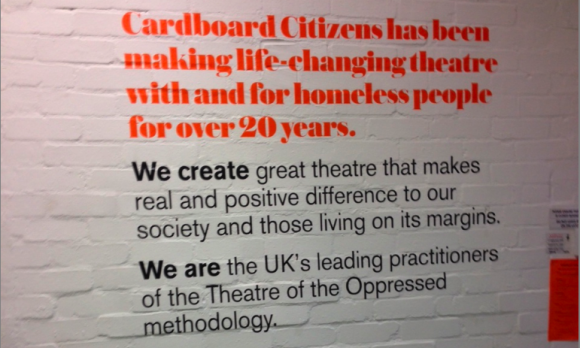Cardboard Citizens
A new interactive play from transformative theatre group Cardboard Citizens breaks new ground. Figen Gunes finds out more
‘Spec-actors’ are wanted to intervene in a new play to help construct a more positive story ending. In the new play Glasshouse, set to tour UK-wide, the audience is encouraged to come up to the stage in the second half for a “rehearsal for life”. The offer itself feels even more unsual given the reserve of most British theatre-going audiences.
Glasshouse is the first major tour in years by Cardboard Citizens, the UK ‘s most established and the largest homeless people’s professional theatre group. Initially set up in 1991 due to rising levels of homelessness, which led to some London boroughs being called ‘cardboard towns’ in response to Margaret Thatcher’s policies at that time, they base all their plays on real life however gritty.
And the theatre is seen as the forum for people to think about their own lives when the Cardboard Citizens teams visit hostels for acting workshops as part of their ‘Forum Theatre’ concept.
Their latest production, Glasshouse, written by Kate Tempest, is hoping to showcase the difficulties of staying together as a family in modern-day Britain. It is a great chance to talk about family and what it means to everyone. Organizers are keen to see if there are regional differences in the way people treat this idea.
Adrian Jackson, director and founder of Cardboard Citizens, says they offer “a really good Roll’s Royce support to vulnerable people” through employment in art. He puts it this way: “When we first started it was an experiment. We were one and a half people trying to do something good for society at large: social support, producing art and also trying to do the administration side.
“As three co-founders we had daytime jobs so we were only giving half of our time. We have a team of 14 people today specialising in different areas. We help the homeless with progression routes to employment. We will be there to help them achieve.”
Cardboard Citizens players have long been welcomed in hostels, as the actors are either homeless or formerly homeless people. The aim is always to get decent salaries for actors during rehearsals and tours.
“We were born the same year as The Big Issue. One of the things that was really most important about the creation of the Big Issue is it’s not just the means of people getting a little bit of money, but when John Bird created The Big Issue it created a context for a conversation between homeless people and non-homeless people.
“It is the facilitation of those conversations which I think is the greatest achievement of the Big Issue. When would you talk to a homeless person in the street? I think the Big Issue vendors play small versions of forum theatres in the streets to create interaction with non-homeless people,” says Jackson.
Acting as the ‘Joker’ in the new play, Terry O’Leary explains his character doesn’t belong to either cast or audience being a facilitator in this interactive theatre; the question is if the audience were in the shoes of those characters, what would they do? Having watched with the issues unfolding on the stage, the audience are invited to come on to the stage and take part. So the audience are called ‘spec-actors’, a cross between a spectator and an actor.
Having involved with the Cardboard Citizens for more than a decade, O’Leary explains the role of the Joker is a bit like a devil’s advocate. “This is not a wish theatre where we wish. It is based on the audience’s own personal experiences. They come with their own strategies. That provokes people to get up to give directions, challenging negative views of homelessness and also getting people to see how difficult homelessness is.
“By making all those small changes, we can at the end of the play agree, if those small actions were taken by the audience the outcome would have been different,” says the Joker to emphasise taking part on the stage may lead to transformative endings in real life too.
With the main aim of breaking up the vicious circles homeless people face, O’Leary says: “Homeless people only talk to two types of people. Only the people they live with or agency workers. This theatre is a way of breaking that homeless cycle.”
Having lived in hostels 15 years ago, O’Leary says it’s a completely different beast: “Homelessness now is much more difficult, especially in London; very few hostels allow you self-refer yourself. Government now wants you to prove you are homeless and seen on the street.”
At their new, first-ever permanent Cardboard Citizens rehearsal studio, the walls are decorated with inspirational quotes by Augusto Boal, the founder of Forum Theatre: ‘The Theatre Of The Oppressed’; ‘Your Name In Lights’: an installation made up of painted lightbulbs suspended from the ceiling bearing the names of patrons.
When asked whether or not middle class audiences wanted to see the show to share their potential solutions to the matters played out, Jackson says he does not have a concern about people’s class: “Dysfunctional families transcend class. Money does not insulate you against disasters, it just makes it bearable. You can be prime minister of France but find it difficult to manage your lovelife. Desire is an uncontrollable thing. People fall for other people. Stuff happens.”
The company works with over 3,000 homeless and ex-homeless people each year, using performing arts to give homeless people a voice. It enables them to build skills and confidence, and supports individuals making positive changes in their lives.
The Cardboard Citizens and Glasshouse tour continues to 18 May.















Write Your Comment